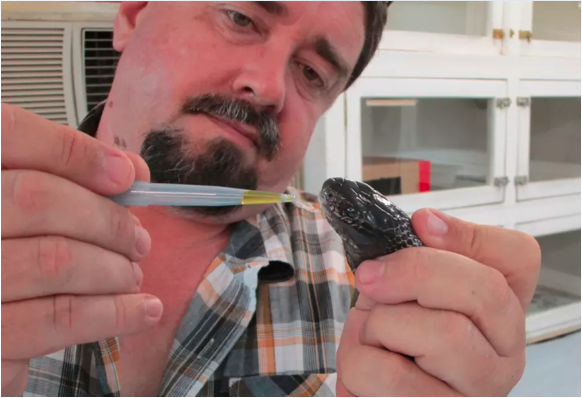Australian expert to chair WHO snakebite working group

A University of Melbourne snakebite expert will chair the World Health Organization’s new Snakebite Envenoming Working Group, which hopes to improve treatment of the five million people bitten by venomous snakes globally each year.
Dr David Williams, who heads the university’s Australian Venom Research Unit, was appointed to chair the Working Group in December and will combine the role with his work improving antivenom availability in Papua New Guinea.
The move follows a June 2017 WHO decision to reinstate snakebite to the highest priority list of Neglected Tropical Diseases.
Venomous snakes bite five million people globally each year. Between 81 000-138 000 of them die and more than 400,000 are permanently disabled in Sub-Saharan Africa, Asia, Latin America and Papua New Guinea.
In many cases, substandard health systems, remoteness and inadequate (or ineffective) antivenom supplies reduce the victims’ survival odds.
The WHO Snakebite Envenoming Working Group will focus on improving antivenom suitability and access, medical training and health systems/infrastructure.
“The idea is to produce a comprehensive plan that WHO and countries can use to tackle the problem around the world,” Dr Williams said.
“By the end of this year we will have a road map, and if a strong case can be made, hopefully the vital resources needed to implement it will follow.
“It’s very exciting to see that what you’ve been trying to push for a number of years is finally building a momentum. The important thing from our perspective is international recognition and having the potential to play a major role in a global movement that has the potential to save hundreds of thousands of lives.”
Dr Williams, who has himself survived six snakebites, including by the deadly Papuan and Australian coastal taipans, also heads the Charles Campbell Toxinology Centre at the University of Papua New Guinea.
The centre runs a snakebite treatment clinic at the Port Moresby General Hospital. A collaboration between the hospital, the University of Melbourne and the University of Papua New Guinea, the centre treats and educate locals, extracts venom from snakes for antivenom production, conducts research and co-ordinates snakebite treatment training.
In 2012, the centre began a $1.4 million NHMRC-funded research project that has developed a new Papuan taipan antivenom with the Instituto Clodomiro Picado in Costa Rica.
The soon to be published study found that the new product, which costs $150 a vial, is as effective as the existing $2000 antivenom.
Up to 450 victims now present to the centre each year, up from 80-90 when it opened six years ago. Ninety per cent have been bitten by the Papuan taipan and fatality rates have fallen from an average of 15 per cent to less than two per cent.
The antivenom trial is finished and the new antivenom is ready to go into commercial production, but lack of funding support for the snakebite project itself is pushing the roll out date backwards.
Reductions in research funding in Australia and PNG have left the project struggling to attract funding for 2018. It needs up to $450 000 annually to effectively continue its treatment and research programs, yet since 2016 funding has become progressively harder to secure.
“Our work saves lives every day, and we could achieve so much more if we had the resources, but funding snakebite work outside Australia is increasingly difficult,” Dr Williams said.